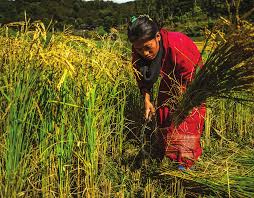The Asian Development Bank announced on Tuesday that it will invest at least $14 billion through 2025 to assist alleviate the region’s escalating food crisis.
The development lender claimed that due to poverty and rising food prices, 1.1 billion people in the region lack access to a healthy diet and will be helped through a comprehensive program of assistance.
The news was made at the ADB’s annual meeting, which was held in Manila, Philippines.
ADB President Masatsugu Asakawa remarked, “This is a timely and urgently required response to a situation that is leaving too many poor families in Asia hungry and in deeper poverty.”
By bolstering agriculture and food supply to combat climate change and biodiversity loss, the plan argues for enhancing long-term food security. The monies will help both new and ongoing initiatives in the areas of agriculture, food production and distribution, water resource management, and social support, according to the ADB.
According to Asakawa, assistance will be given to those who are most in need right away, especially women.
Asakawa stated that the economic picture has gotten worse with the Russian invasion of Ukraine, skyrocketing prices for numerous commodities, and a harsher economic climate due to rising interest rates and weaker currencies for many developing nations in his opening remarks to the ADB meeting.
The bank recently revised its prediction for regional growth downward from an earlier estimate of 5.2% to 4.3%. The forecast for 2019 calls for yearly growth of 4.9%.
Food insecurity has gotten worse with the conflict in Ukraine, a major provider of grain, oil, and fertilizer to several nations in the region, and threatens to reverse decades of advancement.
Asakawa observed that when harsh weather is amplified by climate change, harvests would suffer and migration will increase, making the situation worse.
The U.N. food chief recently issued a warning that the world is experiencing “a perfect storm on top of a perfect storm” and pleaded with donors, particularly Gulf countries and billionaires, to donate a few days’ worth of profits to address the crisis in the fertilizer supply in order to avoid severe food shortages in the coming year.
For instance, this summer’s severe floods in Pakistan destroyed vast tracts of crops, raising concerns about food shortages.
According to the World Health Organization, about 38 million Pakistanis, or more than 16% of the population, were already experiencing moderate to severe food insecurity before the floods, making it difficult for them to get enough to eat or occasionally going without. Almost 18% of kids were severely undernourished.
Pakistan’s economy was already in shambles as a result of escalating debt issues and rising costs. U.N. agencies have cautioned that the damage to the food supply and incomes will push those populations even further into starvation.
According to the ADB, the coronavirus pandemic had already contributed to the hunger of an additional 100 million individuals. It claims that a 10% increase in food price inflation might cause 64 million more people to live in poverty.


















